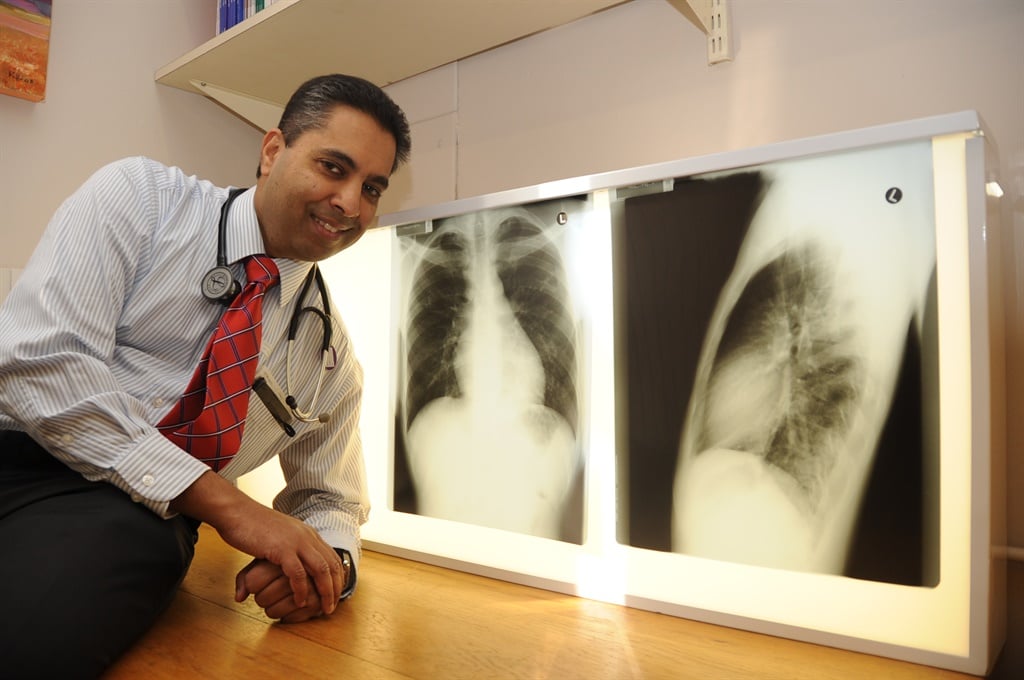
People infected with Covid-19 coronavirus and those with TB can experience similar symptoms such as coughing and breathing difficulties as both diseases affect the lungs. Exactly how these diseases affect the lungs, however, differs.
Professor Keertan Dheda, general physician, pulmonologist and a critical care specialist who heads the division of pulmonology at Groote Schuur Hospital and the University of Cape Town (UCT), explains that Sars-CoV-2 – the virus causing Covid-19 – infects the lining of the respiratory tract, including the nose and the cells lining the tiny air sacs of the lung (also known as the alveoli).
“Associated with each air sac is a tiny network of blood vessels which allow the transfer of oxygen from the lung air sac into the blood,” says Dheda. “The virus also directly infects the cells lining the blood vessels. Thus, there is infection of both the air sac and the blood vessel lining [also known as the alveolar-capillary unit]. This initial infection results in fluid and inflammatory cells accumulating in millions of these tiny air sacs.”
Dheda explains that this is what is called pneumonia.
“There are some special features of Covid-19 pneumonia. For example, the inflammation in Covid-19 pneumonia is also pathologically associated with membranes made up of cell debris and dead tissue lining the air sacs, which further compromises transfer of oxygen to the blood. This specific type of damage is called diffuse alveolar damage.”
This explains why Covid-19 patients often need oxygen therapy such as high-flow nasal oxygen and in more severe cases mechanical ventilation.
Dheda explains that the pneumonia can progress rapidly and can also be associated with the clotting of blood in the small vessels surrounding the air sacs.
“This phenomenon, also called microvascular thrombosis, occurs in many organs, including the kidneys, the heart and the liver. The infection can also hyper-stimulate the immune system, which is activated by the body as a defence mechanism. This immune hyper-activation [also called a cytokine storm] can also cause further damage,” he says.
Read | Covid-19: How mechanical ventilation has saved lives at Groote Schuur Hospital
“In some cases, the pneumonia is so severe that mechanical ventilation or artificial oxygenation of the blood may be required. Death may occur in about 20% of hospitalised cases or 1% to 2% of all infected cases depending on disease severity and the presence of co-morbidities. In such patients the lungs are heavy, full of fluid, and characterised by diffuse alveolar damage and clots in many of the small blood vessels,” he explains.
Lung pathology in Covid-19 versus TB
Dheda says TB is also a form of pneumonia but the pneumonia is more chronic and also involves the airways.
“TB more often involves the upper regions of the lungs, progresses over weeks to months [and even years] and is characterised by breakdown of the lungs and with chronic production of thick sputum. The outer lung coverings [pleura] and airways can often be involved,” he says.
“Covid-19 on the other hand,” Dheda explains, “is associated with a rapidly progressive pneumonia [over a number of days], more commonly affects the lower parts of the lungs, is much more often associated with blood clots in the small blood vessels of the lung, and rarely affects the outer lung covering or the airways.”
Despite these differences, Dheda says at times it may be difficult to distinguish the two diseases.
“Interestingly, an acute form of TB presenting within several days, for example, acute TB pneumonia, also occurs much more frequently than we think. It is now widely recognised in Africa and Asia that acute TB pneumonia is a common occurrence. Thus, in some cases, it may be difficult to separate out the two.”
Dheda says often Covid-19 may occur on “the background of active TB, which is often asymptomatic and slowly progressive”.
“This is not unusual given that 400 000 new cases of TB occur per year in South Africa, and in some parts of the country one to two out of every 100 people have TB.”
This, he says, is a very high number of people for a single infectious disease.
“Indeed, more than 60 000 people a year die from TB in South Africa and this occurs on a year-on-year basis [compared to roughly under 20 000 recorded deaths from Covid-19 in South Africa so far]. The mortality from TB over previous decades has been astronomical,” he notes.
Covid-19 and comorbidities
Dheda says how badly the lung is affected depends on the age of the person, pre-existing lung damage, comorbidities such as diabetes, hypertension, previous TB, HIV and the infecting dose among others.
“Genetic make-up also plays a big role because although those with comorbidities are likely more susceptible and also have more severe disease, most individuals with comorbidities are unaffected by Covid-19 [in other words, of all those with a comorbidity that are infected, a sizeable majority will not progress to severe disease],” he says.
“The pneumonia and organ damage occurs directly from the virus and also from the reaction of the body’s immune system. It is for this reason that anti-inflammatory drugs such as steroids are also used to treat the disease,” Dheda explains.
He says it is important to emphasise that this process, with the severity requiring hospital admission, occurs in fewer than 5% of all infected persons (or fewer than 20% of persons with symptoms).
Dheda says it is unclear why such severe disease only occurs in a small proportion of individuals. But this may be due to a combination of factors such as age, comorbidities which relates to a less healthy endothelial lining (lining of blood vessels), the infecting dose, pre-existing organ damage. The genetic make-up of individuals also influences how the immune system will respond to infection in any one person.
Post-infectious scarring
Though some Covid-19 patients recover from the virus, Dheda says post-infectious scarring of the lungs and non-resolving blood clots are the biggest problems.
“The lining of the small and large airways doesn’t seem to be affected too much by Covid-19 and thus symptoms are unlike those seen in asthma and chronic obstructive pulmonary disease. The severity of post-Covid-19 lung disease will depend on several factors including infecting dose, age, pre-existing lung damage, and the severity of disease,” he says.
According to Dheda in South Africa, the picture is even more complicated.
“Covid-19 is only one of the many insults that the lung may have to endure. It is often the case that individuals may have previously had TB, HIV and/or have been exposed to a number of respiratory insults including biomass fuel exposure, tobacco smoking, exposure to mining dust and poor respiratory health from a young age due to outdoor air pollution and lack of access to healthcare,” he says.
In a South African setting, he says that having two or more of these diseases or risk factors is not uncommon.
Dheda tells Spotlight it remains unclear if there is medium- to long-term chronic ongoing inflammation in the lungs but this is the basis of a research project they – Groote Schuur and UCT – are currently conducting.
“Other organs, including the heart, may suffer from scarring and dysfunction and this may also lead to breathing problems due to fluid accumulating in the lungs. Similarly, other organs such as the kidneys, the pancreas and the liver may also suffer chronic damage in some cases,” he says.
Challenges and lessons from Covid-19
Dheda says teamwork with frequent communication and levelling of hierarchies is essential in fighting a disease such as Covid-19.
“The epidemic made us rethink how we deal with non-Covid conditions and we should leverage what we have learnt from Covid-19,” he says. “For example, screening apps could also be used to screen for TB. Daily dashboards of TB numbers and deaths could also be very useful.
“The department of health is in the process of considering and implementing some of these approaches.”
Dheda says the decline in the number of TB cases diagnosed within the last few months is a major concern. “We need to think about going out into the community to actively find TB cases. We need to think more deeply about how we can deal with non-Covid conditions such as TB, heart disease [and] diabetes when we get second waves, so these conditions are not substantially side-lined.
“In some ways, the fall-out and impact from a second wave may be even higher from neglected non Covid conditions than from Covid-19 itself,” he says.
*This article was produced by Spotlight – health journalism in the public interest.
| ||||||||||||||||||||||||||||||
 |




 Publications
Publications
 Partners
Partners











